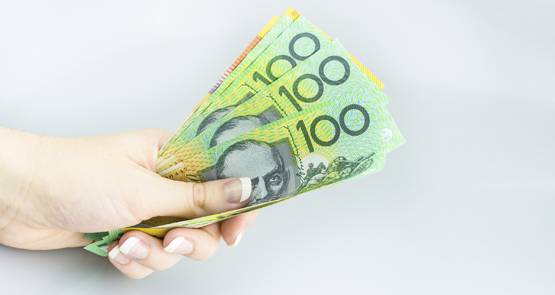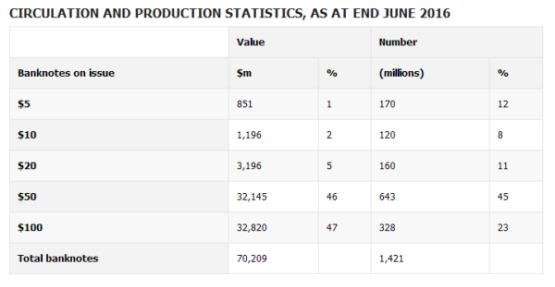
PM Malcolm Turnbull’s government has proposed removing the $100 bill from circulation, as well as targeting the “black economy” — also known as the cash economy — as a form of budget repair.
Financial Services Minister Kelly O’Dwyer argues the cash economy includes $21 billion, or 1.5% of GDP, that is going untaxed.
The government argues removing the $100 bill would: prevent those in the cash economy from being able to engage in cash-in-hand jobs as easily; put an end to tax avoidance via cash transactions; and make criminal dealings more difficult. This will be done in addition to forming a task force that will look at the “black economy” and propose solutions to how it could be combatted.
Why do we have $100 bills in circulation and why were they introduced?
The $100 bill was introduced in 1984 and accounts for 23% of all bills in circulation as of June 2016. This equates to over $32 billion or 47% of the total monetary value of all notes in the Australian economy.
Despite representing nearly half of the total value of all notes in Australia most $100 bills are not in active circulation, according the RBA. The RBA has limited data on the turnover of the bills, but less 10% of $100 bills returned are destroyed, which implies they are not used very often.
So why were they introduced? Professor Steve Worthington of Swinburne University told Crikey $100 bills were introduced, quite simply, “so that Australians did not have to carry so many lower denomination notes”. This demand is why they remain in circulation. In 2016, demand for $100 bills increased their circulation by 9%, according the RBA’s annual report.
Source: RBA
Where are all the $100 bills and who has them?
If Australia has so many bills in circulation, where are they? ATMs rarely stock them. Worthington suggests they are being held by a mixture of groups, including criminal organisations. It also includes those who are paid cash-in-hand and businesses that trade in cash, like corner stores or bakeries.
The Australian also recently reported there’s a buy-up of high denomination bank notes like $100 bills stemming from China. Interestingly enough, these bank notes are often returned to the RBA unopened.
What is the future of the $100 bill and high-denomination notes?
Alongside Australia, the United States and Europe are considering removing their $100 bill and 500 euro bill respectively. Like Australia, they argue these bills are being used by criminal elements to move undetected.
Recently, India removed their high-denomination notes, the 500 and 1000 rupee, to considerable dismay. Worthington uses this as example to consider the unintended impacts, “What would be the impact on tourists in Australia who may want to pay for many thing in cash?”
How does the government plan to combat the ‘black economy’?
The taskforce assembled will be headed by former KPMG global chairman Michael Andrew. The Sydney Morning Herald reports he will look at France and Sweden’s models as they require businesses to have a certified cash register to trade in cash. The potential savings earned will not be included in the mid-year budget but in the 2017 budget as the taskforce will hand in their interim report the month prior.
While Worthington believes the government is addressing the issue properly he is uncertain whether the task force will create effective solutions to address the “black economy”.








You remove the $100 and then end up with the same problem with $50s. I suppose they hope to catch people as they try to cash in the bills.
Moving towards having cash being illegal must make the banks happy.
I thought that the GST was supposed to wipe out the black economy, that’s what John Howard said.
Exactly my thought Curmudgeon! If we do away with the $100 bills, will we then be able to abolish the GST?
That was just another Howard non-core promise…..
Income is a slippery concept. Taxing land and resources is a better way: it’s efficient, and practically impossible to avoid.
The world’s accountants and tax lawyers will then be liberated from the shackles of their unproductive employment.
And here was silly old me believing Howard’s repeated assurances that the GST would stop the ‘black economy’. Obviously Ms O’Dwyer was not born when these assurances were being given ad-nauseum
If $100 notes help citizens circumvent the Theft Tax on day to day living transactions introduced by H0ward to fund a 17% reduction in company tax then it is better that the notes be retained.
Monkey see, monkey do? Modi’s Indians did it – so why shouldn’t we?
These “black economists” would never think of using twice as many $50 bills to cover an engineered gap like this one.